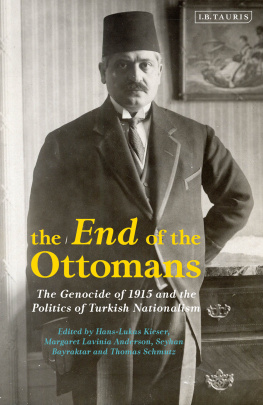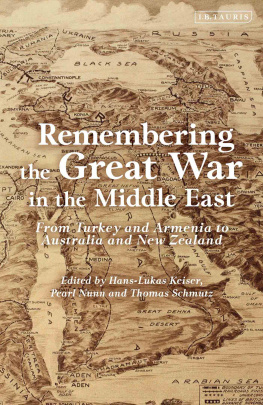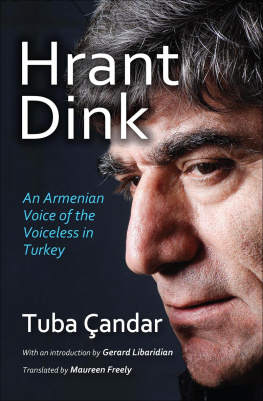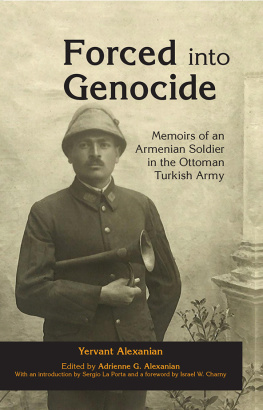
End of the Ottomans

Contents
Maps
Figures
For the various stages in making the present volume, the generous support, in terms of funding, infrastructure and otherwise, by the following institutions has been critical: the Swiss National Science Foundation; the University of Newcastle, Australia, and its Centre for the History of Violence; the Australian Research Foundation (Future Fellowship H.-L. Kieser, FT130100481); the Historical Department of the University of Zurich; and the Research Foundation Switzerland-Turkey, Basel (now the Research Association Switzerland Turkey).
Part of a broader project titled Ottoman Cataclysm, this volume is the outcome of two meetings at the University of Zurich: the international exploratory workshop titled The Levant in the Shadow of World War I: Unhealed Wounds, Perpetuated Patterns of 1113 January 2017, which was a follow-up to the international conference Ottoman Cataclysm: Total War, Genocide, and Distant Futures in the Middle East (19151917) of 2831 October 2015. For excellent assistance in the organization of these gatherings, we thank Fatima Leine, Fabienne Meyer, Thomas Schmutz and Barbara Welter. At these meetings, the authors and editors were able to profit from discussions with scholars who are not otherwise named in this volume: Hlya Adak, Mustafa Aksakal, Aye Gl Altnay, Yuval Ben-Bassat, Donald Bloxham, Valentina Calzolari, Namk Kemal Din, Philip Dwyer, Kazm and Nezahat Gndoan, Dotan Halevy, Peter Holquist, Stefan Ihrig, Sossie Kasbarian, Erol Krolu, Nazan Maksudyan, Kerem ktem, Maurus Reinkowski, Dominik J. Schaller, Daniel Marc Segesser, Talin Suciyan, Elizabeth Thompson, Uur . ngr, Erik J. Zrcher and, digitally connected, Candan Badem and Lerna Ekmekcioglu. Several of them will appear as authors in two future volumes, also outcomes of the Zurich meetings and the overall project.
Special warm thanks are due to co-editor Margaret Lavinia Anderson for her strong commitment, far beyond that of an editor, to the coherence, readability and quality of the chapters. Special warm thanks also to our copy editor, Joanna Mullins.
Margaret Lavinia Anderson is Professor of History emerita at the University of California, Berkeley. In addition to articles and two books on Imperial Germany, she has published Down in Turkey Far Away: Human Rights, the Armenian Massacres, and Orientalism in Wilhelmine Germany, Journal of Modern History 79, no. 1 (March 2007): 80113; Who Still Talked about the Extermination of the Armenians? German Talk and German Silences, in N. Naimark, R. G. Suny and F. M. Gek (eds), A Question of Genocide (2011), pp. 199217, 3729; Helden in Zeiten eines Vlkermords? Armin T. Wegner, Ernst Jckh, Henry Morgenthau, in R. Hosfeld (ed.), Johannes Lepsius Eine deutsche Ausnahme. Der Vlkermord an den Armeniern, Humanitarismus und Menschenrechte (2013), pp. 12671; and A Responsibility to Protest? The Public, the Powers and the Armenians in the Era of Abdlhamid II, Journal of Genocide Research 14, no. 2 (JulyAugust 2015): 25983.
Candan Badem is Associate Professor of History. He received his BA from Boazii University in 1992, his MA from the University of Birmingham in 2001 and his PhD from Sabanc University in 2007. His publications include The Ottoman Crimean War (2010); arlk Rusyas Ynetiminde Kars Vilayeti (2010); and with S. Mirzoyan, The Construction of the TiflisAleksandropolKars Railway (2013), as well as articles on the Armenian Question. He is one of the very few scholars from Turkey to have done research at the National Archive of Armenia. His main areas of study are the OttomanRussian wars in the nineteenth and twentieth centuries and the OttomanRussian borderlands with a focus on the South Caucasus. He is one of the signatories of the Academics for Peace petition in Turkey. On 1 September 2016 along with many other academics he was purged from all state universities by a state of emergency decree.
Seyhan Bayraktar is Publication Coordinator at the Zurich University of Applied Sciences. She received her PhD in Political Science from the University of Konstanz in 2009. Her research areas include the politics of memory and apology, TurkeyEU relations and political communication. She has taught and published widely on Turkeys politics of denial with regard to the Armenian genocide, and is the author of a number of articles as well as Politik und Erinnerung. Der Armeniermord im trkischen Diskurs zwischen Nationalismus und Europisierung (2010).
Hamit Bozarslan received his PhD in History on the intellectual currents in the late Ottoman Empire at the cole des Hautes tudes en Sciences Sociales (EHESS) in 1992 and his PhD in political science in 1994 at the Institut dtudes politiques (IEP) in Paris on the regionalization of the Kurdish issue. He teaches at the EHESS in Paris. His publications include, with G. Demelmestre, Quest-ce une rvolution? Etats-Unis, France, Monde arabe (2016); Rvolution et tat de violence. Moyen-Orient 20112015 (2015); Le luxe et la violence. Domination et contestation chez Ibn Khaldn (2014); Histoire de la Turquie. De lEmpire nos jours (2013); Une histoire de la violence au Moyen-Orient. De la fin de lEmpire ottoman al-Qaida (2008); From Political Struggle to Self-Sacrifice: Violence in the Middle East (2004); and La question kurde: Etats et minorits au Moyen-Orient (1997).
Hilmar Kaiser is Researcher at Yerevan State University. He received his PhD from the European University Institute in Florence. His work focuses on late Ottoman social and economic history and particularly on the Armenian genocide. His publications include The Extermination of Armenians in the Diarbekir Region (2014); At the Crossroads of Der Zor: Death, Survival, and Humanitarian Resistance in Aleppo, 19151917 (2001); Humanitrer Widerstand gegen den Genozid an den Armeniern in Aleppo, in R. Hosfeld and C. Pschichholz (eds), Das Deutsche Reich und der Vlkermord an den Armeniern (2017); Shukru Bey and the Armenian Deportations in the Fall of 1915, in T. iek (ed.), Syria in World War I: Politics, Economy, and Society (2016); and Genocide at the Twilight of the Ottoman Empire, in D. Bloxham and A. D. Moses (eds), The Oxford Handbook of Genocide Studies (2010).
Raymond H. Kvorkian, Director of Research emeritus at the Institut Franais de Gopolitique (Universit Paris VIII, Saint-Denis), received his PhD in History in 1980 and his Habilitation in 1999. He has been curator of the following exhibitions: Armnie, entre Orient et Occident (Bibliothque nationale de France, 1996); Reconstruire la nation, les rfugis armniens au Proche-Orient et en France (Cit Nationale de lHistoire de lImmigration, 20078); and Armnie 1915 (Htel-de-ville de Paris, 2015). His publications include Le Gnocide des Armniens (2006), translated into English (2011), Turkish (2015), Russian (2015) and Arabic (2016); with L. Nordiguian and V. Tachjian, Les Armniens, 19171939, la qute dun refuge (2007); with Y. Ternon, Mmorial du gnocide des Armniens (2014); and with H. Bozarslan and V. Duclert, Comprendre le gnocide des Armniens (2015).
Hans-Lukas Kieser, historian, is an Australian Research Council Future Fellow (201419), an Associate Professor at the University of Newcastle NSW, and a
Next page







